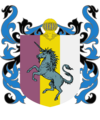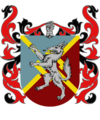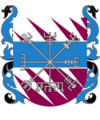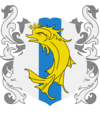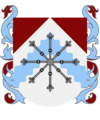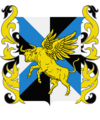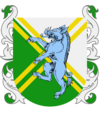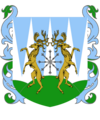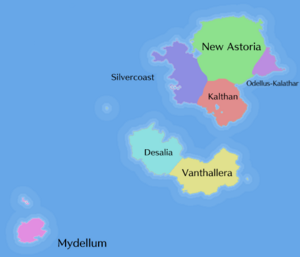Lost Astoria
Constitutional Monarchy of Lost Astoria Astoria Dellus Chandras (Astorian) | |
|---|---|
| Motto: "Malestharium Tol Sanlineria" "Promise and Precision" | |
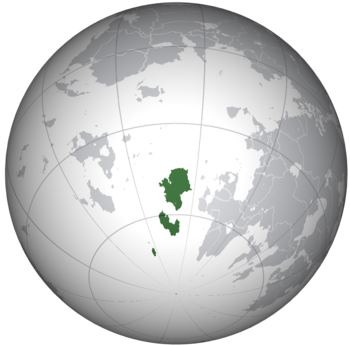 Lost Astoria's location in regards to Caleren and surrounding landmasses | |
| Capital and | Odellus-Kalathar |
| Official languages | Astorian |
| Recognised national languages | Common |
| Ethnic groups | 82.6% Astorian 12.4% Native Kalathandric ~2% foreign-born (estimated) |
| Demonym(s) | Lost Astorian (official), Astorian |
| Government | Constitutional Diarchy |
• Archthane of Odellus | Elidibus Dal Astor |
• Archthane of Kalathar | Viatroth Dal Kalathandras XXII |
| House of Thanes | |
| House of the People | |
| Establishment | |
• Discovery and settlement by the Kingdom of Kalathandras | 776 BCE |
• Establishment of Asphodellium Astoria | 16th November 1108 |
• Acquired independence | 29th April 1519 |
• Modern diarchy | 12th July 1519 |
| Population | |
• 2024 estimate | 19,131,287 |
• 2020 census | 18,937,364 |
| Currency | Hawkpence (𓄿) |
Lost Astoria, known officially as the Constitutional Monarchy of Lost Astoria (Astorian: Astoria Dellus Chandras), is a diarchy located in the southeastern end of Caleren. Lost Astoria is located to the east of the Old Soldiers and the Ganji Islands, and is surrounded by the Hagalaz Ocean and Kaldaz Ocean. Lost Astoria retained a closed-country policy from 1519 to early 2024, when it reopened its ports to send humanitarian aid to Anavero. As a result, almost all of the country is ethnically either Astorian or Native Kalathandric, though some immigrants have settled in the country since borders were opened. Lost Astoria currently trades with Greater Penguinia, Adrinian, and Cordomonivence.
Lost Astoria was first discovered by the Kalathandric people, initially being settled around 776 BCE. The established Kingdom of Kalathandras lived in isolation until the archipelago was discovered by the Astor Empire. During the empire's conquest of Caleren, the Kalathandric royal family was imprisoned and executed in Odellus, the kingdom's royal coliseum. Under Astorian rule, the archipelago became the Penal Colony of Asphodellium Astoria in 1108, which held most of the empire's most dangerous prisoners for much of its reign. The modern country was established in 1519, when the Chainbreaker's Uprising, a prison riot that began in the historical capital of Kalathar, led to the declaration of Lost Astoria's independence by Viatroth Dal Kalathar I. The uprising ended with the complete excision of all Astorian authority from the archipelago save Odellus, earning it the name Astoria Dellus Chandras (lit. "Astoria Without Tyranny").
After Lost Astoria gained independence, Viatroth I petitioned the Lord of Odellus, Themis Dal Astor, to yield the heavily fortified city to Lost Astoria. In exchange for this, Themis would be named Archthane of Odellus, ruling in tandem with Viatroth I, Archthane of Kalathar. The capital then merged with Odellus to create the nation's current capital, Odellus-Kalathar.
Government
Lost Astoria is governed by a constitutional diarchy, with the “Archthanes” of the nation acting as monarchs of a sort. The main difference between a conventional monarch and an Archthane is the legal treatment of land; when an Archthane dies, the land that they held is given to the other Archthane until a new Archthane is chosen to inherit it. Additionally, the Archthane position has no direct line of succession; instead, royal houses in general hold the line of succession, with the individual Archthane being chosen by the opposite incumbent Archthane. Since the nation’s founding, the Houses of Astor and Kalathandras have held the positions of Archthane of Odellus and Archthane of Kalathar respectively. Historically, the two Archthanes shared similar power, but recent changes in diplomacy has led to the Archthane of Odellus becoming the country’s international figurehead, while the Archthane of Kalathar has retained a more domestic position.
The nation’s constitution contains the right for the people to assemble, which has led to the creation of a parliament. The House of Thanes contains the descendants of Astorian nobility, while the House of the People contains the elected representatives of the masses. This division of parliament was part of Viatroth Dal Kalathar I’s agreement with Themis Dal Astor to unify the nation, as this compromise would ensure the continued endurance of the upper class in the new country. Over time, however, the House of Thanes has experienced a decrease in national power; today, the House of Thanes mainly deals with bureaucratic affairs instead, with the House of the People dealing with the nation at large.
The federal court of Lost Astoria is colloquially called the Hawk’s Court, though it is known officially as the Supreme Court. It has earned its colloquial name from the nature of the government’s judicial branch; half of the judges are appointed by the House of Thanes, and half are elected by the House of the People.
There are eight major noble houses of Lost Astoria. Note that the term “Sol” indicates a Thane, or the head of a house, while “Dal” indicates an Archthane, or the ruler of both a house and Astoria as a whole.
The bloodlines of the noble houses correspond with the leaders of the Chainbreaker’s Uprising, with the exception of the House of Astor, which is the only remaining noble house with ties to the Astor Empire.
Geography
Lost Astoria is an archipelago, with three major islands. Each of the nation’s provinces are controlled by a noble house. Odellus-Kalathar is notable for being controlled by two noble houses.
| Province | Capital | Ruling House |
|---|---|---|
| Odellus-Kalathar | Odellus-Kalathar | House of Astor, House of Kalathandras |
| New Astoria | Etherrot | House of Medyllyn |
| Silvercoast | Anabadel | House of Vulfrum |
| Kalthan | Wullurock | House of Kashrum |
| Desalia | Gelibor | House of Halleryck |
| Vanthallera | Linathor | House of Fyljall |
| Mydellum | Shivrum | House of Thaldros |
Climate
Lost Astoria is largely forested, with taiga covering much of the south. Tundra can be found in the nation’s southernmost island and most mountainous regions. The majority of the main island is temperate, though frigid winters are common. All of the nation’s southern ports are inaccessible in the winter, as the Kaldaz Ocean freezes over during this time. Only Odellus-Kalathar is open in the winter months, though ice occasionally forms around the city.
Etymology/Vexillology
Lost Astoria is known as Astoria Dellus Chandras ("Astoria Without Tyranny") in the Astorian language. Its Astorian name originates from the Chainbreaker's Uprising, when the prisoners of Asphodellium Astoria revolted to purge the "tyrranical" Astor Empire from the colony. The name "Lost Astoria" was proliferated by the late Astor Empire, who considered the rogue colony to be "lost" to them due to its volatile nature.
The Lost Astorian flag depicts a naval crown, two quadrupedal Astorian Hawks with no wings, and a background tricolor of purple, silver, and light blue. The crown, colored sanguine, represents the violent history of the nation's founding. The Astorian Hawks represent the two Archthanes that rule the nation, with their wings absent to signify departure from the Astor Empire. The purple represents royalty, the silver represents the steel of a blade, and the light blue represents the Hagalaz and Kaldaz Oceans.
The nation's coat of arms depicts a single Astorian Hawk as seen on the flag, but with the tricolor becoming a chevron and being partially hidden by a gray banner. The banner represents the nation's former status as a penal colony, while the chevron represents the Chainbreaker's Uprising.
Culture
Lost Astorian culture has largely remained unchanged since 1519 due to the country's isolationist policies. Of late, however, a cultural shift has begun, largely due to the country opening its borders. This shift has mostly taken place in Odellus-Kalathar, the nation's most populous city.
A unique form of archery has been developed through Lost Astorian history, with its origins dating back to the Kingdom of Kalathar. This style of archery, known internationally as "Thalleric-Style Bowslinging," specializes in precise shots from a high vantage point, which was historically influenced by the nation's mountainous terrain. Known colloquially as Vanthaller, the practice so ingrained in Lost Astorian culture that modern firearms are banned in the country; this is due to the belief that guns will only taint the ancient tradition. It is mainly used today in the province of Vanthallera to catch livestock, particularly goats.
External Links


